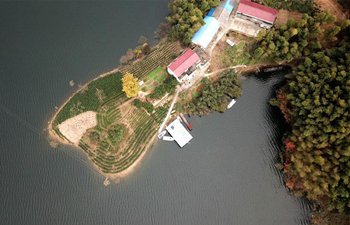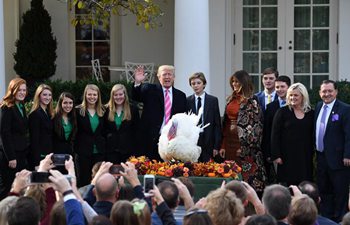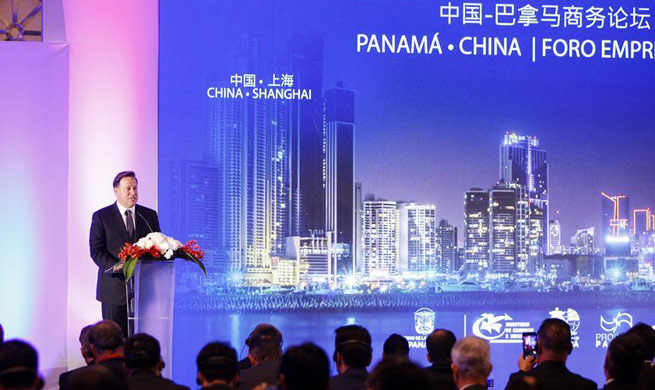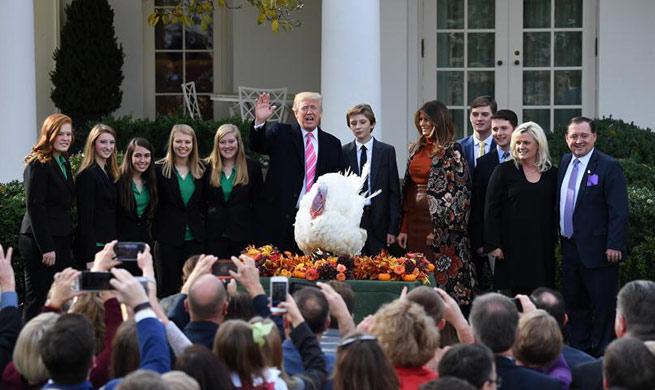LONDON, Nov. 21 (Xinhua) -- British economic growth has been held back by the uncertainties of Brexit, but it is a more profound fault with the economy that looks set to make things difficult for the Chancellor of the Exchequer Philip Hammond when he delivers his "budget" on Wednesday.
Hammond will deliver the annual autumn statement, his second, against a backdrop of moderate growth and Brexit uncertainties.
However, it is not Brexit but Britain's continued and prolonged poor productivity performance that will cause a major headache for Hammond.
Hammond can owe his position as chancellor of the exchequer to the change of leadership in the British government brought about by the surprise Brexit referendum vote in June last year.
While Brexit has brought him a job, it has also brought headaches. It has affected the economy so that it is now the weakest performing of G7 nations.
Annual GDP growth in Britain, according to Organization for Economic Cooperation and Development (OECD) figures released on Monday, was 1.5 percent, the slowest rate of growth in the club of seven rich nations,namely Canada, France, Germany, Italy, Japan, Britain and the United States.
Britain has slipped from second highest in the group's growth rankings in 2016 to bottom now.
Hammond's real problem comes from the poor productivity, before the financial crisis in 2008 productivity would improve by 2 percent per year.
But the crisis squashed growth and sent productivity figures into reverse with Britain only regaining the pre-crisis level in 2016.
The German and French economies are 36 percent and 30 percent respectively more productive than Britain, although British productivity is assisted by the low rate of unemployment and a record number of jobs.
The unemployment rate is higher in France, at over 10 percent, while in Britain it is a low of 4.3 percent, the lowest for 42 years.
A NEW AND LOWER FIGURE FOR PRODUCTIVITY FORECASTS
The Office for Budget Responsibility (OBR), the official statistics watchdog, has constructed its forecasts for the past six years on the presumption that productivity will return to its trend growth of about 2 percent.
But it has been nowhere near that, averaging 0.2 percent over the past five years.
The OBR in March forecast that this is a new reality and is long term. It has said it will lower its productivity forecasts, perhaps below the 1.6 percent forecast it made back in March.
All the OBR's statistics are the basis for government budget planning and if they change, then the planned income and spending will be different too.
This will have big implications, and cause a big problem for Chancellor Hammond.
"The problem Hammond has got is that the OBR has said that is going to downgrade productivity," Howard Archer, chief economic adviser to the EY ITEM Club, a financial data firm in London, told Xinhua.
"Their forecast for productivity growth means that (with) other things being equal, the public finance figures will be revised up over the medium term. Because if they downgrade their productivity predictions, they are likely to downgrade growth, which will affect their tax revenue," he said.
This will mean Hammond will have less money to play with. The 26 billion pound (34.5 billion U.S. dollar) "wriggle room" he created for himself in March to help him deal with the unknown dangers of Brexit is likely to have been reduced by two thirds, experts say.
Archer said: "Hammond's probably going to find that the medium term outlook is less encouraging than it was in March."
But there is some good news for Hammond.
"The OBR will probably change the forecast for employment. The OBR had forecast that the equilibrium unemployment rate was 5 percent in March and it is now 4.3 percent. If they downgrade productivity they will have to improve employment forecast, which will offset it somewhat," said Archer.
A CAUTIOUS BUDGET?
So, what could be in Chancellor Hammond's autumn statement?
"The chancellor is under pressure to take bold action, I have my doubts he will," said Archer.
Hammond has said he wants to build 300,000 homes each year to tackle a housing crisis.
In addition there are likely infrastructure announcements, possible in the regions outside London.
However, raising money through tax is difficult and cutting public services further is deeply unpopular after seven years of cuts and austerity.
"From the election result it is clear people are fed up with austerity and the squeeze on public sector pay, and Hammond is under pressure to find some money for the National Health Service (NHS) too," said Archer.
"If he does look to spending some big money, he is going to have to look elsewhere to pay for it and I don't think he will do that. I think it will be a cautious budget," he added.

















